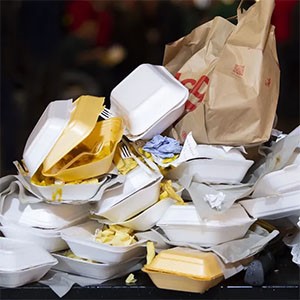 |
|
6/26/2023
|
Rep. Bennett/Sen. Miller bill banning foam enacted
|
 STATE HOUSE – A bill sponsored by Rep. David A. Bennett and Sen. Joshua Miller to ban restaurants from using polystyrene foam, commonly called Styrofoam, for food packaging or preparation has been signed by the governor. STATE HOUSE – A bill sponsored by Rep. David A. Bennett and Sen. Joshua Miller to ban restaurants from using polystyrene foam, commonly called Styrofoam, for food packaging or preparation has been signed by the governor.
“Every time I walk my dogs or am out fishing, I see foam containers on the side of the road, in our woods and in our water,” said Representative Bennett (D-Dist. 20, Warwick, Cranston), who serves as Chairman of the House Committee on Environment and Natural Resources. “I know some people might not like to hear it, they might think this is inconvenient, but we need to stop being such a throwaway society. That foam takeout container you use in a few minutes is going to be around for hundreds of years. When we use alternatives, our environment, wildlife and grandkids all benefit.”
The law (2023-H 5090A, 2023-S 0014B) bans food service establishments from processing, preparing, selling or providing food or beverages in disposable food containers made in whole or in part of polystyrene foam, or from providing beverage stirrers made from plastic.
The law takes effect Jan. 1, 2025, and applies only to restaurants and similar food service establishments, not agricultural fairs, farmers markets, hospitals, nursing homes, “Meals on Wheels”-type programs or charitable organizations that are providing food for free. It does not apply to packaging on prepackaged food items that a restaurant purchases at wholesale, nor to foam coolers or ice chests that are used for processing or shipping food.
Rhode Island joins Maine, Vermont, New York, New Jersey, Virginia, Maryland, Colorado, Washington
and Washington D.C. among jurisdictions that have passed laws banning foam food service containers.
“Foam is one of the worst offenders when it comes to single-use food packaging. It is generally not recycled, and its light weight allows it to easily blow away when it becomes litter, harming our land and marine environments. Even though it is not biodegradable, it easily breaks apart into tiny pieces that can be toxic to a range of wildlife and food chains in our Narragansett Bay ecosystem. Fortunately, today there are so many significantly better alternatives. I’m glad the Ocean State is joining the growing number of states and cities that are saying no to foam,” said Senator Miller (D-Dist. 28, Cranston, Providence).
Polystyrene foam has long been used for packaging because it is cheap to produce, lightweight to ship and effective at retaining both heat and cold. However, it is not recyclable in Rhode Island and endangers animals when it becomes litter.
Even when properly disposed, foam is contributing to the alarming rate at which the state’s landfill is filling up. According to the Rhode Island Resource Recovery Corporation, the state’s central landfill, which services 97% of state residents, will reach capacity by 2040 at current rates of disposal. The state does not have a firm plan for what to do at that point, but all the alternatives are costly.
“2040 isn’t that far off and there’s no affordable alternative once our landfill is full,” said Priscilla De La Cruz, Senior Director of Government Affairs at Audubon Society of Rhode Island. “We need to start transitioning to a zero-waste economy. Banning foam takeout containers is a great place to start because there are plenty of available alternatives that can be recycled or composted instead of ending up on our beaches or in our landfill.”
For more information, contact:
Fil Eden, Publicist
State House Room 20
Providence, RI 02903
401.222.1886
|
|